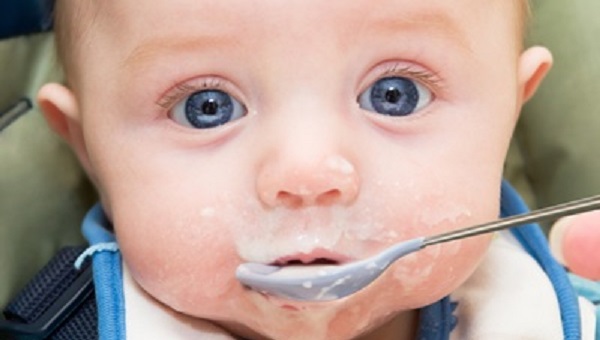Your baby is almost 4 months of age, and you think she’s eyeing your dinner. Her first taste of solid foods may be steadily approaching, but how do you know she’s ready, and how do you introduce them to her?
The only food your infant needs is breast milk or formula, according to the Mayo Clinic, which notes the American Academy of Pediatrics recommends that you exclusively breastfeed your baby for the first six months after her birth. However, between four months and six months, many babies are ready to complement the breast milk or formula with solid foods. Check with your pediatrician before starting solid foods. While every baby is different, you can give them food (besides breast milk or formula) when they’re about 6 months old, according to a recommendation from the pediatrics organization.
The Centers for Disease Control and Prevention (CDC) shares these signs that your little one is developmentally ready for this big step:
- When you offer her food, she opens her mouth and leans forward.
- She has good control of her head.
- She can sit with very little or no support.
You should continue feeding up to 28 ounces per day of breast milk or infant formula to your baby. Then you can follow these suggestions from the Mayo Clinic as you introduce your baby to solid foods:
- Start simple with single-ingredient foods that don’t have salt or sugar. Wait three to five days between offering each new food so you’ll know the cause if your child has a reaction, like a rash or diarrhea. Once you’ve introduced some single-ingredient foods, you can combine them.
- Include important nutrients like zinc and iron that are in iron-fortified, single-grain cereal and pureed meats, as well as lentils and beans.
- Add fruits and vegetables while you continue to gradually offer single-ingredient foods without salt or sugar. Begin with pureed vegetables and then offer fruits to her, but wait three to five days between introducing each new food. The
Mayo Clinic adds that juice isn’t as valuable to your baby’s diet as whole fruit.
If your baby refuses her first servings of pureed foods, don’t force her to eat. Just try again after a week. It may take up to ten tries per food. If this continues and it becomes a problem, contact your child’s doctor. You should also talk with the doctor about allergies if you have a family history of food allergies. The CDC notes that these are the eight most common allergenic foods: eggs, milk, shellfish, fish, peanuts, tree nuts, soybeans and wheat.
There are foods that babies should not eat, according to the Mayo Clinic:
- Don’t give your infant honey or cow’s milk before age 1.
- Don’t feed your baby foods, such as chunks of cheese or meat, hot dogs, raw vegetables, grapes or chunks of fruit, that might cause her to choke. Avoid other hard foods, as well as marshmallows and chunky peanut butter.
- Don’t give a baby younger than 4 months any home-prepared beets, spinach, green beans, carrots or squash, which might have enough nitrates to cause a blood disorder.




